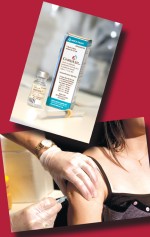STI vaccine may have dangerous side effects

From vaccines for STDs to 3-D mammogram technology and advances in birth control, many women’s lives have been improved or saved because of advents in women’s health.
It appears, however, that one treatment for a widespread sexually transmitted infection (STI) may have severe side effects, causing some to wonder whether it’s worth getting.
Gardasil, a vaccine created to help protect against human papillomavirus (HPV), which can lead to cervical cancer has shown many unexpected side effects in young recipients. HPV is the most common STI, and infects the genital areas and mucous membranes of men and women, according to the Centers for Disease Control (CDC).
The National Vaccine Information Center states that 25 percent of all reports concerning the adverse effects of Gardasil involve neurological symptoms, including loss of consciousness, fainting, dizziness and seizures.
A 14-year-old girl from Washington, D.C. experienced a syncopal episode — which doctors describe as dizziness, fainting and blackouts — as well as poor vision in one eye, abnormal speech, vomiting and headaches, according to the center.
A 17-year-old New York native reported dizziness and said her vision went “black for a few seconds.” Her skin grew pale and her lips turned purple as she experienced a mixture of fever and chills, she said.
“It’s funny to hear that women are having side effects to this — it was just like any other shot to me,” said Sonia Razac, a sophomore majoring in nursing. “The only side effect I heard about was pain at the injection site.”
These cases aren’t alone. On Aug. 2, two hours after being vaccinated, a 15-year-old New York girl who had a history of asthma and was on four asthma medications experienced difficulty swallowing, prompting a visit to the emergency room, according to the report.
Other adverse effects include joint pain and cases of Guillain-Barre syndrome, a disease that may lead to paralysis and in some rare instances, death.
Such drastic reactions have been yet to be seen at USF.
“Out of the 444 vaccinated students in the past two years, there has only been one person to claim an adverse reaction, such as flu-like symptoms,” said Tricia Weaver, a physician’s assistant at the USF Student Health Services’ Women’s Clinic.
Despite Gardasil’s possibly dangerous side effects, the vaccine reduces the number of women who die annually from HPV-caused cancer. Every year 240,000 women die worldwide due to HPV, usually from cervical cancer, according to sciencedaily.com.
“I have never considered being vaccinated for HPV,” said Stephanie Smoak, a senior majoring in theatre. “Hearing of the adverse effects of the vaccine makes me wary of getting vaccinated in the future.”
While some are questioning the safety of Gardasil, others are discussing whether it should also be administered to men.
HPV is very common in men, but most men don’t know they’re infected and therefore have no idea they’re transmitting it to a sexual partner, according to the CDC.
“There is probably no reason to think it would not be effective in boys, and because HPV is passed back and forth, immunizing a large part of the population would limit transmission,” Dr. Jonathan L. Temte, associate professor in the Department of Family Medicine at the University of Wisconsin told healthfinder.gov.
If Gardasil works in men, vaccinating them against HPV could be an important advancement in disease prevention. Because there’s no way to test men for HPV, keeping them from getting the disease could stop it from spreading.
“I highly advocate the use of the vaccine,” Weaver said. “The CDC still has found no serious side effects to be a direct cause of Gardasil.”
Most people infected with HPV never know it because they don’t experience any symptoms, hence its alias, “The Silent Killer.”
For further information, contact USF’s Student Health Services at (813) 974-2331.





